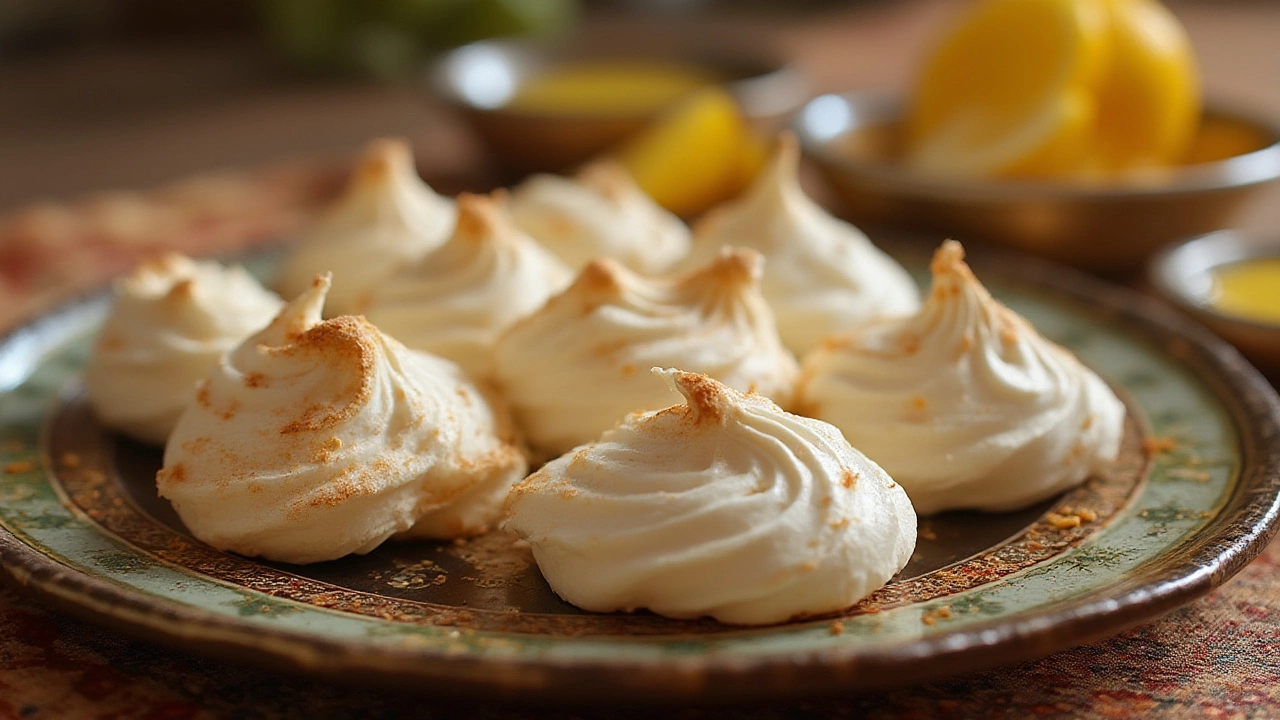Picture this: You’re halfway through whipping up a batch of meringue, and your recipe calls for white wine vinegar—to stabilize those snowy peaks. You peer into your pantry, and the bottle’s empty. Or worse, missing altogether. Should you swap in lemon juice? Will your meringue still bake up light, crisp, and cloud-like? This isn’t just some background baking trivia; the acid you choose can seriously change your results. Let’s cut through the froth and see what each brings to your meringue game.
Why Acid Matters: The Science Behind Meringue Magic
Egg whites might look fragile, but they are science powerhouses. The reason you introduce acid—be it white wine vinegar or lemon juice—is simple: it helps those proteins unwind, keeping your meringue fluffy and stable. Without acid, your egg whites can deflate, or worse, collapse into a sad puddle. Acids literally lower the pH, making it harder for overbeaten proteins to clump up and expel water. Now, does it matter which acid you use? Yes—and no. Both lemon juice and white wine vinegar do the job, but they each add a little something special to the project.
Lemon juice isn’t just acidic—it’s also packed with flavor and volatile oils from citrus peel. White wine vinegar has a milder taste but can enhance the subtle sweetness of the sugar. Both hover around a pH of 2–3, which is right in the sweet spot for meringue stability. According to the American Egg Board, the ideal pH for egg whites in meringue is between 4.5 and 5. That’s what you’re aiming for: a little tart, a little science, and a lot of shine. Here’s the deal: lemon juice can introduce a faint citrus note. If you actually want that, fantastic. If purity is your goal—just sweet, marshmallowy cloud—stick with the vinegar. There’s almost always a little tradeoff between flavor and neutrality.
If you’re wondering how much acid to add, here’s a simple guide: about ½ to 1 teaspoon vinegar or lemon juice per 2–4 egg whites. That kicks protein stability into gear without swamping the taste. If you use too much, both can flatten your meringue’s sweetness or add a hint of bitterness—so resist the urge to eyeball it. Use your teaspoons, not your instincts, here. That’s the first chef’s secret.
Check out this quick look at pH and flavor characteristics:
| Acid | pH Level | Flavor Impact | Best For |
|---|---|---|---|
| White Wine Vinegar | 2.5–3.4 | Neutral, mildly tangy | Classic French meringues, pavlova |
| Lemon Juice | ~2.4 | Citrus zing, bright | Lemon meringue pie, anything with citrus |
| Distilled Vinegar | ~2.4 | Very sharp, can taste harsh | Emergency substitute only |
Still, don’t overthink it: Most home bakers can barely taste the tiny amount you use. Blind taste tests from food science labs—like Cook’s Illustrated—show that unless you have a very refined palate, you may not tell one acid from another once the sugar’s in. But, if you’re baking for a lemon hater or a vinegar skeptic, play it safe with the flavorless option.

Swapping Lemon Juice for White Wine Vinegar: What Changes?
Let’s get down to brass tacks. You have a recipe for meringue, maybe for pavlova, macarons, or little crispy kisses. It asks for white wine vinegar, but you have lemons (or even bottled lemon juice). Can you just swap them one-for-one? Pretty much—just watch the flavor. Here’s how to do it without the drama.
First—think about what your final dessert will taste like. If the meringue is going on top of lemon pie, or you love that citrus brightness, lemon juice is brilliant. It’ll add just a whiff of acidity and aroma. If you want something so neutral it lets your whipped egg whites and vanilla shine, reach for white wine vinegar. It’s that simple. You can switch them in equal measure for most recipes: ½ teaspoon lemon juice per 2 egg whites for stability. If you’re making a big batch, up to 1 teaspoon is safe, as long as you don’t overdo it and add sourness.
Lemon juice has citric acid, while vinegar has acetic acid. Citric acid is a touch more “sparkly” to the taste than acetic, which is why lemon can come across so fresh. The worst thing you can do? Add too much, and your meringue will taste like a cleaning product—not dessert. Common sense goes a long way. If you squeeze your lemons fresh, strain out any seeds and pulp first. Even a little egg yolk or lemon pulp is enough to ruin a meringue by stopping the foam from forming. Clean tools matter! Use a glass or metal bowl—plastic holds grease, and anything greasy kills the fluff.
Here are a few things you might notice if you make the swap:
- A faint citrus tang, especially if your lemon is super fresh.
- Slightly brighter-tasting meringue. Some folks love this; some don’t notice at all.
- The color might be ever-so-slightly yellower, depending on your eggs and juice.
- Texture and structure stay the same. The acid still helps the proteins stabilize, so your meringue won’t collapse.
Studies like those from America’s Test Kitchen show that in blind taste tests, some people find meringue with lemon juice a tad more “lively,” but there’s no compromise in structure. If you follow the right ratios and use fresh, room-temperature eggs, swapping in lemon juice for white wine vinegar won’t sabotage your dessert. Actually, in some lemon-forward recipes, you might never go back. If you want the crunchiest meringue—like those iconic British mini-pavlovas—lemon juice is a smart secret weapon.
Here’s a simple swap table, handy for late-night or panicked baking:
| If Recipe Says: | Swap With: |
|---|---|
| ½ tsp White Wine Vinegar | ½ tsp Lemon Juice |
| 1 tsp White Wine Vinegar | 1 tsp Lemon Juice |
For more control, you might want to measure acidity. Lemon juice can sometimes be more acidic than some vinegars, especially if you’re using Meyer lemons (which are sweeter) or bottled lemon juice (which can sometimes be more tart). If you’re a meticulous baker, a quick taste or pH strip can settle nerves—though most home bakers just go with their guts, or should I say, tongues. A single drop or two less or more won’t make or break a batch.
And a little “aha!” for those who love old-school kitchen hacks: When you’re out of fresh lemons and vinegar, you can even use a pinch of cream of tartar. It’s a powdered acid and offers the stability you want, though without any flavor. It’s actually a classic in French and Swiss meringues. Many old cookbooks mention it as first-choice, with vinegar and lemon juice as good back-ups.

Baking With Lemon Juice: Tips, Risks, and Perfect Results
So you’ve decided to jump in and use lemon juice instead of white wine vinegar. You’re far from alone—it’s probably the most common swap in home kitchens for meringue. Here’s how to make it go perfectly, every single time.
First, squeeze your lemon just before using it. Bottled juice can work, but it sometimes has a stronger, almost metallic taste because of preservatives. Always strain out seeds and any pulp. Even a tiny bit can disrupt the airy texture you want. Use fresh, large eggs at room temperature. Cold eggs whip up, but slowly. Room temp is faster, fluffier, and makes your meringue more voluminous—scientifically proven by side-by-side tests in British baking schools. And remember: Even a drop of yolk or grease can ruin the entire batch. Start with a sparkling-clean metal or glass bowl, free from any oily residue. Paper towels wetted with a little vinegar or lemon juice are great for wiping out bowls before you start, oddly enough.
When adding sugar, go slow. A tablespoon at a time, letting it dissolve before you add the next. This keeps your meringue glossy and stable, whether you use lemon juice or white wine vinegar. Rushing the process creates gritty, weepy meringues. Nobody loves that. If your mixer’s on full blast and sugar flies everywhere, stop and slow down. Add acid once your eggs start to froth—it doesn’t matter if it’s before or after sugar, but it should be early on, not at the end.
Here are some common pitfalls with lemon juice, and how to avoid them:
- Too much acid: Your meringue can taste sour, or the texture can go rubbery. Stick to ½–1 teaspoon per 2–4 eggs.
- Not enough acid: Your peaks won’t hold. Don’t skip the acid, or your meringue will slump in the oven.
- Low-quality bottled juice: Can bring weird flavors. Fresh juice is safer and more delicious.
Professional bakers sometimes guard their favorite trick: a microplane of lemon zest added into the meringue for extra zing and color. If you love a citrusy finish, try it. For the purest, fluffiest meringue, skip the zest—aim for just acid doing the heavy lifting.
If you’re serious about precision, here’s a quick cheat sheet for setting yourself up for pro-level baking:
- Always measure acid carefully—a little goes a long way.
- Use a copper, glass, or stainless-steel bowl. Avoid plastic, which holds grease.
- Whip to stiff peaks—not dry peaks. They should stand up firm, but not start breaking apart.
- If you’re unsure, bake a trial half-batch first—see if you like the lemon flavor in your meringue.
- For best piping, load your meringue straight into a pastry bag and move quickly—the longer it sits, the more it can start to deflate.
One truth most baking pros will tell you: meringue recipes are more forgiving than they seem. The margin for “flop” is actually pretty wide as long as you respect the basic ratios and keep your bowl clean. Lemon juice is a lifeline ingredient for when white wine vinegar’s out of reach, and it’s been used for generations, from grandmas with vintage mixers to next-gen pastry chefs. If anything, it’s worth baking a double batch—one with each acid—to see what your crowd prefers. For most of us, lemon juice meringue is every bit as airy, crisp, and showy as those made with the classic vinegar touch. There’s no single right answer—just what works for you, your flavor preferences, and the quirks of your kitchen. Lemon juice doesn’t just keep those peaks stiff and glossy—it’s a subtle flavor upgrade, too, if that’s your thing.
So next time you’re standing at the fridge, lemon in hand, don’t hesitate. Your meringue is in very good hands—or should I say, very good eggs.